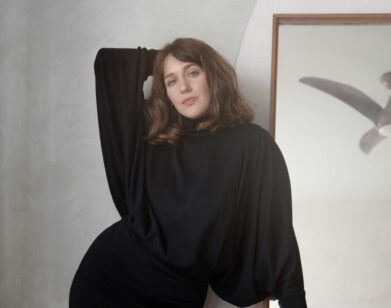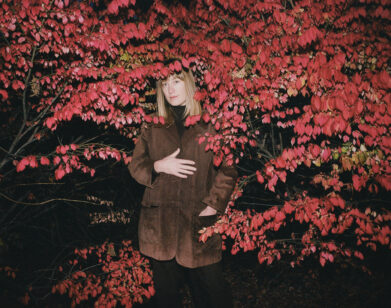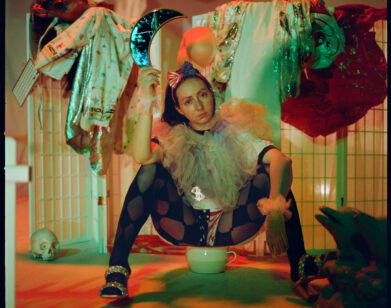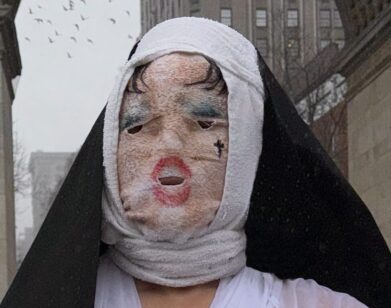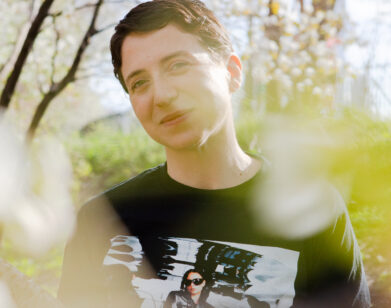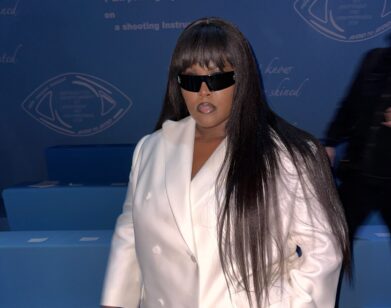Musician No Bra Shares Some Good Reads on Gay Smut and Anti-Capitalism
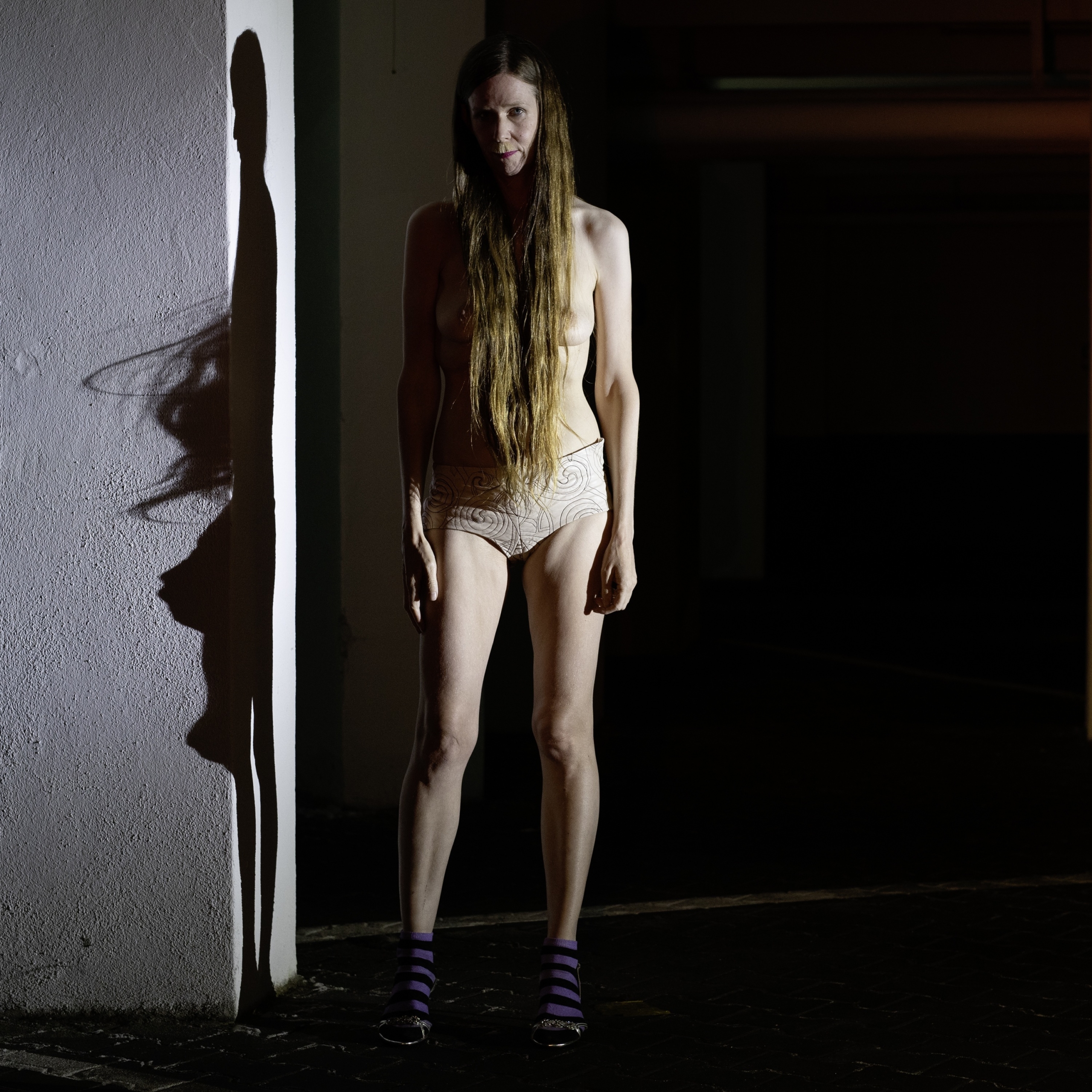
Photo by Wolfgang Tillmans.
No Bra, the musical project of Susanne Oberbeck, is more than just a cheeky name; it also alludes to Oberbeck’s signature style of performance: topless, her impossibly long russet hair barely covering her nipples. There’s a blunt hedonism to No Bra’s stage shows as well as her music, which consists of Oberbeck in an amorphous European accent reciting wry, witty lyrics over a percussive electro-dance beat. Her third album LOVE & POWER, out this week, includes the tracks “Sex Slaves in the White House” and “Prostitutes,” its prevailing mood NSFW but also not-safe-for-neoliberalism. Throughout, Oberbeck deconstructs the relationship between what is popularly defined as good taste, binary thinking, and capitalist exploitation—without ever taking herself too seriously.
Oberbeck started No Bra in East London in 2003 with Fanny Paul Clinton, before going solo and subsequently moving to New York in 2010. Early support came from BBC DJ Pete Tong, and over the years, Oberbeck’s worked with Bruce LaBruce, Mykki Blanco, Arca, Hedi Slimane, Abdu Ali (featured on the new track “Who is the God”), and Wolfgang Tillmans (who shot No Bra’s latest album cover).
The video for “Bangin,” the first single off her new album, centers around a bird’s-eye-view shot of Oberbeck in a circle of topless gender-non-specific bodies. “I wanted to imply the idea of sex that went past binaries, but in a way that wasn’t pornographic,” she says. “I wasn’t interested in being explicit. It was more about there being a threat or implication of something powerful.” When Oberbeck posted a clip on her Instagram, it was censored for nipplage, drawing attention to the persistent absurdity of the app’s unequal nipple censorship. According to Oberbeck, “all of these things are intended to pin people against each other and distract from the fact that a big corporation is profiting from everybody’s constant unpaid work.” With both French theory and gay smut informing her anti-capitalist worldview, we asked the German-born provocateur to share her master reading list. Consider it something of a holiday gift guide for the anti-consumerist.
———

Deleuze and Guattari, Anti-Oedipus
“The book’s main argument is that the whole ideology of Freud, psychoanalysis, Oedipus, and the family serves capitalist ideology. It establishes that this reality of an ‘identity’ rooted in one’s history, upbringing, and familial relations eventually becomes so burdensome for people that they seek escape via consumerism — you can imagine being someone else, whoever the product you buy represents. Without this very 20th-century American idea of identity, consumerism in its current form wouldn’t properly function. As a way of subverting capitalism, Deleuze and Guattari developed the idea of ‘becoming’—rather than being something unalterable, one is always ‘becoming’ something else, becoming woman, becoming animal, etc. There’s also an emphasis on the idea of community and people’s relations rather than their separate identities. I came across this book a long time ago and wrote my dissertation about it. It’s influenced most of my work since. For example, in my song “Munchausen,” the characters lie constantly and continually merge into other improbable identities.”
———

Deleuze and Guattari, A Thousand Plateaus
“The argument here is a continuation of Anti-Oedipus, but there’s also a lot about music, for example analyzing how familiar ‘refrains’ align with a certain family-oriented ideology and how music serves as propaganda. It’s a bit of a hardcore stance that when taken literally doesn’t necessarily make for very interesting or fun music. I’m more interested in Deleuze and Guattari’s ideas about human relations than sound because I like melodies and catchy music.”
———

William Burroughs, The Soft Machine
“In the sense that there’s a character who changes shape and merges into other characters, the text seems to employ some of Deleuze and Guattari’s ideas, even though I’m sure Burroughs had zero interest in reading their theoretical writing. I’m not a drug person, but I’m interested in how substances can de-emphasize the focus on individuality and personal agency, and are possibly a response to all of that being too much for people—because it’s actually not natural. When I first moved to London, I found this book in a bookshop in Camden called Compendium that’s sadly no longer there. Reading Burroughs is a bit cliché now, but I also think he’s often misinterpreted. I see his writing as a starting point for ideas and not needing to be taken too literally.”
———
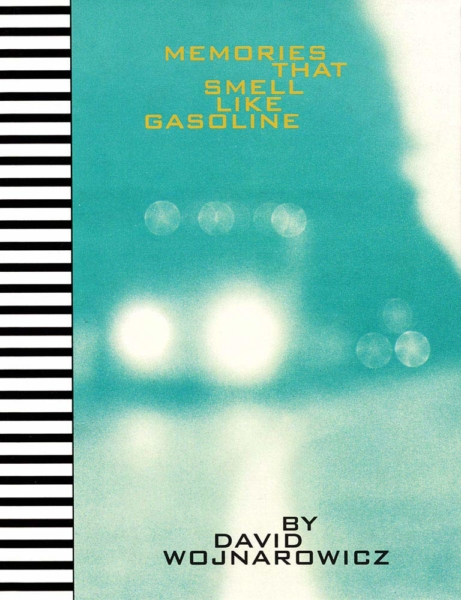
David Wojnarowicz, Memories that Smell Like Gasoline
“This book is a memoir of Wojnarowicz traveling around the U.S., meeting random guys, having sex, talking to them, getting to know their stories. The men he meets are often closeted gay men or at least compromised in their existence. There’s a lot in this cross-country cruise that’s deeply critical of the ideas of masculinity and morality inherent to the ‘American Dream.’ At PPOW Gallery in Chelsea, I saw some of Wojnarowicz’s films. They were amazing, aggressive, uncompromising, and scary. I loved them. He also had this band 3 Teens Kill 4, which is worth checking out.”
———
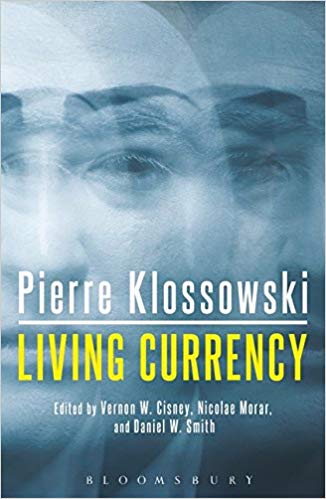
Pierre Klossowski, Living Currency
“This book’s main argument is that the capitalist system and ideology we live under has actually infiltrated every single interaction we have as humans. People are universally being seen as ‘commodities’ in some way or other. Here is a great quote from it: ‘The accumulation of wealth by a privileged few establishes the existence of fraud as much in psychic exchange as in the distribution of goods.’ The song on my new album ‘Bangin’ is about an affair I had that seemed to involve some level of mutual objectification due to our ‘backgrounds.’ It’s a bit like prostitution without money. It seemed like they were more comfortable treating the relationship like a transaction, and I think that’s quite common.”
———

Straight to Hell (S.T.H.)
“S.T.H. (Straight To Hell) magazine was published in the ’70s and it was gay men sending in stories and photos of random hook ups, publishing them anonymously. It’s mostly really normal dudes meeting other guys in various locations around New York City. (The full title includes The Manhattan Review of Unnatural Acts). It’s interesting because it’s all pre-internet. There’s a sense of adventure, freedom, anonymity, and the transcendence of class and race, to some degree, that appeals to me. The magazine’s issues have more recently been re-edited and published by Billy Miller who I met when I first started doing No Bra. There’s a lot of literature by gay men about cruising and it’s recently been getting some attention in the art world, but it’s also weird that there seems to be no mention of it for women. Not saying cruising is necessarily my preferred method of soliciting sex, but I find the option should exist for everyone!”
———
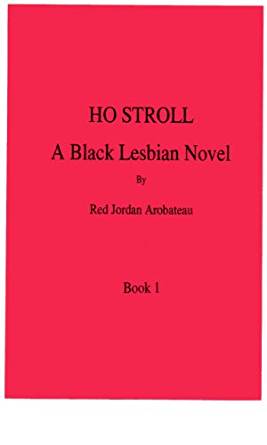
Ho Stroll, Red Jordan Arobateau
“Years ago I read this pulp fiction-ish novel written by a black lesbian writer about a character’s nightly cruising adventures, set in Chicago. I think it was by this writer Red Jordan Arobateu. However I have yet to come across something comparable written by straight women. There’s some in Lydia Lunch’s short fiction and there was a French movie called Baise-Moi, but a lot of the time female cruising behavior seems to be tied to ideas of revenge or some history of abuse, which, even though I’m sure it’s real, reinforces the idea of victimhood. And it’s weird that it just doesn’t seem to exist otherwise. Probably for that reason, in the past, some of my songs were understood to be written from the point of view of a gay man. In the song “Hard Town,” I was trying to make the female point of view more clear.”
———
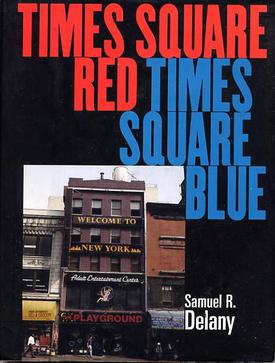
Samuel Delaney, Times Square Red Times Square Blue
“This book is made up of two essays about the gentrification of Times Square and New York in general. It includes a lot of diary-style recollections from the the past, when there were still hookers and gay porn cinemas. I also love Delaney’s sci-fi novel The Einstein Intersection and some of his short fiction. I did a reading of his formerly censored novel Hogg at this queer art book fair. It seemed to make people there quite uncomfortable.”

